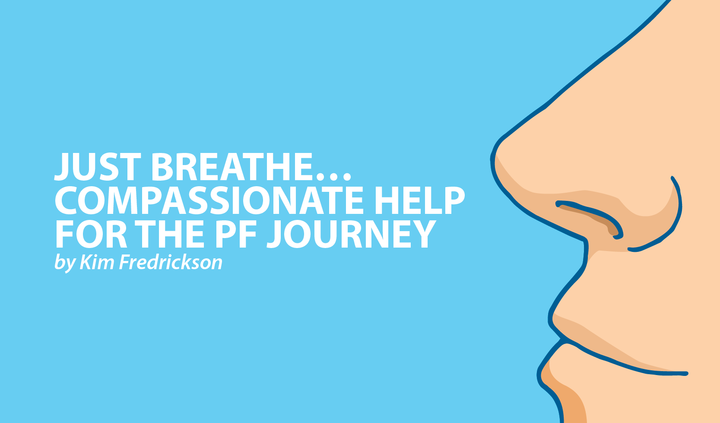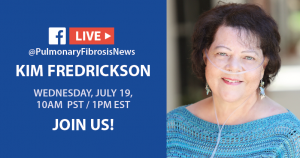Questions Raised During Live Facebook Session Were Eye-opening
Written by |


Last week I had the privilege of doing a live video, via Pulmonary Fibrosis News’ Facebook page. It was a lot of fun to have so many patients, caregivers and medical professionals tune in as we talked about treatment. The beauty of a Facebook Live video is that it is available to watch later, even if you couldn’t tune in live. As of today, 4,900 people across the world have watched it and more than 100 people have left comments about their own experiences with PF. If you missed it, don’t worry; you can watch it now.
 I shared my personal story of being diagnosed with pulmonary fibrosis three years ago as a rare side effect from chemo and radiation to treat breast cancer. This only happens to 1%-2% of people treated for cancer. I don’t like being “special,” and I know you don’t either.
I shared my personal story of being diagnosed with pulmonary fibrosis three years ago as a rare side effect from chemo and radiation to treat breast cancer. This only happens to 1%-2% of people treated for cancer. I don’t like being “special,” and I know you don’t either.
Today, I decided to share some of what I shared on the video about living with PF, as well as what I learned from the experience. I belong to a few online PF Facebook groups, and asked my peeps ahead of time what they’d like me to talk about. I got several great suggestions. What struck me was that all of them asked me to talk about medical questions such as:
- What treatment is most effective?
- What type of medications to take?
- What is the difference between PF (pulmonary fibrosis) and IPF (idiopathic pulmonary fibrosis)?
- What about supplemental oxygen use?
I wanted to answers these questions in a credible way, but I’m not a doctor. I was intrigued by the underlying issue of these questions and so many others we need answers to.
Having PF is complicated and there are no easy answers!
- Pulmonary fibrosis isn’t just one disease. It is a family of more than 200 different lung diseases that all look very much alike. The PF family of lung diseases falls into an even larger group of diseases called the interstitial lung diseases (also known as ILD), which includes all of the diseases that have inflammation and/or scarring in the lung. Most people with PF actually have idiopathic PF (IPF), which means your doctor doesn’t know the cause of your scarring.
- PF patients are all different. Some patients remain in stable condition for periods of time, others may experience a rapid progression of symptoms, while others might slowly worsen over time. Treatment plans are individualized, based on our medical history and other factors.
- There are medications available that may slow the progression of our disease. Which ones are appropriate depends on what type of lung disease you have, what caused your PF (if you know – most people don’t), whether you are stable or not, and whether you have other significant diseases. These medications can cause side effects that are tolerable for some patients, but not for others.
- Supplemental oxygen really helps. It helps us feel better and function better, but obtaining it and getting insurance and providers to cover it can be a nightmare.
- Ultimately, the only real treatment is getting a lung transplant. Whether you are eligible for one is highly individual as well. Things they look at are our overall health, whether we are at ideal body weight, have other life-threatening illness, our support system, and whether they feel we’ll be compliant with medication and exercise.
No wonder we are confused and unsure about treatment.
While we share a common diagnosis with the same awful end result, we are different enough that there are no set answers to questions about which medications to take, or the best treatment options.
The Pulmonary Fibrosis Foundation has an information guide for patients and caregivers (in English and Spanish). It has lots of good information about the questions listed above, as well as many others.
First, be compassionate with yourself about what you’re going through,
Being diagnosed with a terminal illness is beyond difficult. On top of this, not being able to get absolute answers about prognosis and treatment is maddening.
When I was diagnosed with breast cancer, it was horrible. My best friend was battling this disease and I saw how much suffering she went through. As hard as it was, there was comfort in knowing what the treatment plan was. I didn’t experience confusion about what to do, or feel like I had to figure everything out. I also didn’t have to fight for the basics I needed, like oxygen!
It struck me that not only is being diagnosed with a terminal illness indescribably hard, this is only part of it. Being diagnosed with a rare disease like pulmonary fibrosis adds a level of stress, confusion and sometimes despair that makes our reality a million times harder.
Second, our questions are good.
We want to know about prognosis, treatment, oxygen, lung transplant possibilities, and ways to cope. There are many unknowns that cause us angst, fear, grief and confusion. We deserve to have these questions answered, and it’s so hard when they aren’t. Before I go to my doctor’s appointments I write down my long list of questions and get as many answers as possible. It helps me to know which treatment is possible, and which isn’t. It helps me adjust to reality.
Third, we need support, and lots of it.
We crave information, comfort, hope, and connecting with others who understand what we are going through. This is true for patients, caregivers and loved ones.
There are lots of ways to get support, in addition to the help we get from our doctors, friends and loved ones. We also can get information online, but be careful where you look, or it can be the blind leading the blind. I wrote a column recently in which I listed reputable groups and websites you can check out for information and support.
In conclusion, I enjoyed doing the live Facebook video and interacting with others. Those who left comments were so encouraging and helpful. Our community is very supportive and a source of strength and encouragement to me. I hope to you as well. I would love to hear from you in the comments below.
***
Note: Pulmonary Fibrosis News is strictly a news and information website about the disease. It does not provide medical advice, diagnosis, or treatment. This content is not intended to be a substitute for professional medical advice, diagnosis, or treatment. Always seek the advice of your physician or other qualified health provider with any questions you may have regarding a medical condition. Never disregard professional medical advice or delay in seeking it because of something you have read on this website. The opinions expressed in this column are not those of Pulmonary Fibrosis News, or its parent company, Bionews Services, and are intended to spark discussion about issues pertaining to pulmonary fibrosis.
Save




Beverly Rooker
Would like to know what site to go to for more information about my condition. On 3L day 2Lnight beginning May 2015,24/7,now 12L day 8L night. On hospice last two months, which have been a Godsend, especially when the rescue package is necessary in the middle of the night. Seems pulmonary Dr. has given up, he'll be there for me when I end up in hospital, won't let me suffer. Family Dr. more help working with hospice. Know I am in end stage and going down again but wonder if any caregivers know of what to look forward to happening. I am not the type to give up, always hearing sit down save your air, just natural to do it myself. Any knowledge would be helpful. Bless you all!
Evelyn Hudson
Thank you for sharing your feelings. It is very helpful to learn what others, like myself, are going through. May God Bless you!
Kim Fredrickson
Yes Evelyn, It was so nice of Beverly to share feelings and questions we all have. God Blessing you too!
Kim Fredrickson
Hi Beverly,
Thanks so much for your comment. So sorry you are in the end stage. I know what you mean, it is so hard to not be given the information you need. I have had a similar struggle to find this out. It as if the docs don't want us to give up. I'm glad hospice has been so helpful to you. What I have personally seen in some online support groups is that the end is different for each person. I'll bet you've heard that before. Some have had a very peaceful transition...needing more O2, but sleeping a lot. Others may struggle with breathing or pain, which can be addressed. I wish I could give you more information. I'll do some research and see if I can find more information. Blessings to you as you care for yourself.
JUDY KRASOVEC
Yes cancer was scary but this disease is so UN known and that in it self is like playing Spin the Bottle ! Is today the day , What will I do to cause an attack, will this just be an attack or will this be the END! It's not so much the dying, but the not knowing how bad I will get or.....
Kim Fredrickson
So true Judy! I know you understand. It is the not knowing that is so hard. I just keep trying to make the most of each day... Hugs to you.
Maureen Lake
I'm usually a glass is half full kind of person. When I was diagnosed with Breast CA in 2012, I felt as if someone had knocked my glass over, but as you say I had a plan & was able to fill it back up pretty readily. In Jan 2015, hen I was diagnosed with IPF (not associated with my breast CA) not only did my glass fall over, but someone kicked it across the room. Since then, I have found the glass, sat it back up & have been able to fill it back 1/2 way, but there are many days when I feel it's tipping over & I have to put it right. Some days are harder than others, but with the support & love from my husband, family & friends & believe it or not, my dogs; I survive.
Kim Fredrickson
Maureen, Thanks so much for your wonderful analogy. I totally relate. You are so right, support from family and friends really helps...and for me my 2 kittens. Blessings to you dear one.
Henry Finelli
Thank you for this great news information
Kim Fredrickson
You're welcome Henry...so glad it was helpful!
mort
Is there a current list of clinical trials for IPF of injectable or inhaled drugs?
Is there a current list of experimental drugs US & OUS labs (not OFEV or Esbriet)?
Thank you
Kim Fredrickson
Hello Mort,
I'm so sorry I don't know the answer to your question.
katherine broach
my confusion is i read that at anytime things can take a turn with IPF and yet when i thought i was experiencing a downturn, my pulmonologist's NP tells me it doesn't happen that quickly. I have read extensively that it can and it does. i have come to terms with this disease. i have been fortunate to be in my 4th year after diagnosis and still on the 'well spectrum' despite the fatigue, and short windedness. I have outlived my cough. some days it is hard to walk from room to room in my small apartment. i live alone and while i have loving children, they are
busy working and raising families. They consider any IPF symptoms as typical for anyone my age (79) and to be expected just like my painful stenosis and arthritis. Or I can invite a lecture for failing to exercise while I'm struggling to put together a simple meal. When I have a couple of good, active days, I'm exhausted in the days that follow. I pace myself to get to dr. appointments, grocery, bank, pharmacy. I get depressed from pain and the restrictions the disease places on me. I live alone, having moved away from friends to be close to family in an emergency. I'm having trouble making a full life for myself in unfamiliar territory geographically and physically. I still drive, am an avid reader, cannot care for a pet, and cannot picture the end stage if this is the my best while on the well spectrum. Can the well spectrum end suddenly and move into end stages as I've read? I've put my things 'in order' in anticipation of the possibility. I've toyed w/assisted living in anticipation of the inevitable. meantime, i have a helper 2 hrs a week and dread any move.
Kim Fredrickson
Hello Katherine,
It is so hard to get answers to your very good questions. I know for some people the end comes gradually, and for others not. The unknowns are so difficult. It sounds like you are doing all you can to enjoy your loved ones and things you still enjoy. I'm so sorry they don't fully understand what you are dealing with. We all do, and I'm so glad you shared.
Joan W
You are sitting next to me on the same page! Carbon copy
yet different persona. Patience and perseverance a must. Search to rescue yourself. Be informed ~ aware ~ share ~ kind to yourself. ASK for help.
Don't apologize as you do need friends and/or family. You are not alone, you are by yourself.
Kim Fredrickson
Dear Joan, What a lovely kind response to what Katherine shared. It really helps to know others understand.
Ann Waggy
I just enjoyed reading all the above. I was diagnosed four years ago with IPF and began oxygen at 2L, 24/7, even before the diagnosis. I also began an exercise program through our local hospital that does cardio and pulmonary re-hab. The exercises are the same for both, pretty much. I've noticed I've slowed down a lot since I began, as to amount of time on treadmill and other machines. The shortness of breath has caused me to increase my oxygen to 3L and sometimes 4L. Just this week, I began OFEV. My doctor had me on Cell Cept and I've been on and off Prednisone over these four years, currently on 10 mg. I'm praying that this new med helps overall, but need to hear if anyone else is on it and how they are doing. It's not a good feeling to not be able to do all I previously did, like gardening, walking, etc. Just turned 75 this week and am happy to be here at that age. Family history did not include 70's.
Kim Fredrickson
Hi Ann, Thanks for your comment, and for sharing your experiences. I can't comment personally about Ofev, but I hope it is a help to you. Maybe others can share with you about their experiences. It is hard to adjust to not being able to do what we used to. Good for you for doing all you can to stay healthy and enjoy the things you love :)